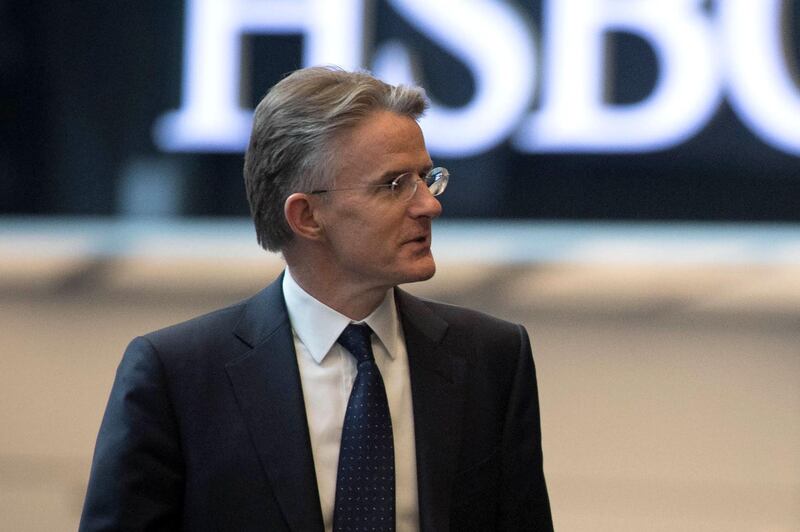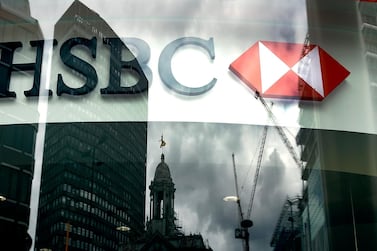Extraordinary times require extraordinary measures.
Just 18 months into the job, John Flint has stepped down as chief executive of HSBC. It may be time for this lumbering giant to turn to an outsider rather than the homegrown veterans that the bank has typically chosen as its leaders.
Mr Flint was cut from the same cloth as his predecessors, having joined the lender as a trainee from college in 1989. The London-based bank is facing hard times and difficult decisions are necessary. While the timing of his departure is a surprise, it would be hard to argue that a low-key manager steeped in decades of HSBC’s genteel culture is best placed to tackle the challenges that lie ahead.
And make no mistake: the outlook for the bank is tough, despite buoyant first-half earnings. HSBC released results as a general strike added to the disruption from nine straight weekends of unrest in Hong Kong, its biggest single market. The bank is exposed to a worsening US-China trade war as well as the risk of a no-deal Brexit in the UK. Meanwhile, it has an underperforming US business and hasn’t done enough to trim its bloated workforce.
Second-quarter pretax profit rose a creditable 4 per cent from a year earlier to $6.2 billion (Dh22.76bn). The bank said first-half adjusted jaws – a measure that relates the growth in revenue to the increase in costs – was a positive 4.5 per cent. Mr Flint failed to achieve positive jaws by the end of 2018, a key target of his first year in charge.
Headwinds are mounting. Mr Flint took over in early 2018 when global interest rates were beginning to rise; last week’s cut by the US Federal Reserve heralds a return to easy, cheap money that will compress net interest margins for banks. Hong Kong’s GDP growth has been hurt by the trade war and the worsening protests and the impending arrival of digital banks may pose an even bigger threat. The bank holds 30 per cent of the deposits in the city, which contributed almost 60 per cent of pretax profit last year.
These problems would be more tractable if the bank had done more to slim down. It had 235,000 employees at the end of last year. Mr Flint has pushed to cut 500 investment-banking jobs since June, although it’s unclear whether this will make much of a difference when rivals are doing the same. On Monday HSBC said it plans to axe more than 4,000 posts with senior executives a focus of the cutbacks and expects severance costs to range from $650 million to $700m in 2019, with annualised savings of a similar amount, according to an investor presentation.
Investment banking, and especially trading, has been in secular decline since the global financial crisis, weighed down by slowing economies, lacklustre activity and increasing automation. HSBC’s investment bank is a long-term underperformer yet still accounted for a fifth of its global workforce last year.
The continued US drag on profitability doesn’t help. On Monday, HSBC said its US adjusted first-half pretax profit was a mere $400m, down 36 per cent down from a year earlier, while return on tangible equity was just 2.5 per cent. It won’t reach a target of 6 per cent by 2020. The bank’s stock has flagged since Mr Flint began his tenure.
Ultimately, HSBC needs fresh blood – someone from outside its silo-ridden ranks, or at the very least, an insider with chutzpah and power. Chairman Mark Tucker, the first outsider to hold that post in HSBC’s 154-year history, said the board “believes a change is needed to meet the challenges that we face and to capture the very significant opportunities before us”. Mr Tucker is a famously hard-charging and decisive manager, as I noted when he was selected by HSBC two years ago.
Unlike the chairman, the CEO also has to be a storyteller, one that can convince investors there’s growth to be had and that challenges can be met. Standard Chartered’s Bill Winters offers a useful contrast. The StanChart CEO is doing a good job convincing investors of the value of its African digital bank and has obtained a virtual bank licence in Hong Kong. HSBC didn’t even apply. DBS Group is also reaping success from its online forays, while Asian corporate-banking rival Citigroup has stayed on top of regional supply-chain financing.
Expect HSBC’s next CEO to be more in the Mr Tucker mold.







